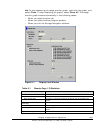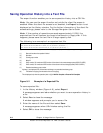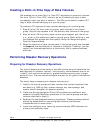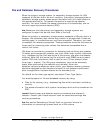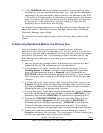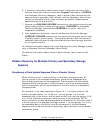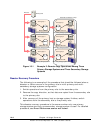
10-2 Chapter 10 Usage Scenarios
Hitachi Universal Replicator for IBM /OS User’s Guide
Creating a Point-in-Time Copy of Data Volumes
URz enables you to make Point-in-Time (PiT) duplicates of groups of volumes.
The term "Point-in-Time (PiT)" refers to an act of obtaining a copy of data
immediately when you want to obtain it. The URz can be used to create a PiT
copy of data volumes belonging to a journal group.
To produce a PiT duplicate of data volumes belonging to a journal group:
1. Stop all write I/Os from hosts to primary data volumes in the journal
group. Stop all host updates to all URz primary data volumes in the group.
2. After all write I/Os to primary data volume have stopped, split the mirror
(i.e., a pair of the master and restore journal group. When splitting it, use
the Suspend Pair window and then specify Group for Range and specify
Flush for Suspend Mode.
3. When the status of all data volume pairs in the journal group has changed
to Suspend, the duplicate set of volumes is complete. If desired, you can
restart your business application at the primary site to resume business
activities.
Performing Disaster Recovery Operations
Preparing for Disaster Recovery Operations
The type of disaster and the status of the URz volume pairs will determine the
best approach for disaster recovery. Unfortunately, some disasters are not so
“orderly” and involve intermittent or gradual failures occurring over a longer
period of time. The user should anticipate and plan for all types of failures and
disasters.
The major steps in preparing for disaster recovery are:
1. Identify the journal groups and data volumes that contain important files
and data (e.g. DB2 log files, master catalogs, key user catalogs, and
system control datasets) for disaster recovery.
2. Install the Storage Navigator PC and URz hardware and software, and
establish Universal Replicator operations for the journal groups and data
volumes identified in step (1).
3. Establish file and database recovery procedures. These procedures should
already be established for recovering data volumes that become
inaccessible due to some failure.
4. Install and configure error reporting communications (ERC) between the
primary and secondary sites.






